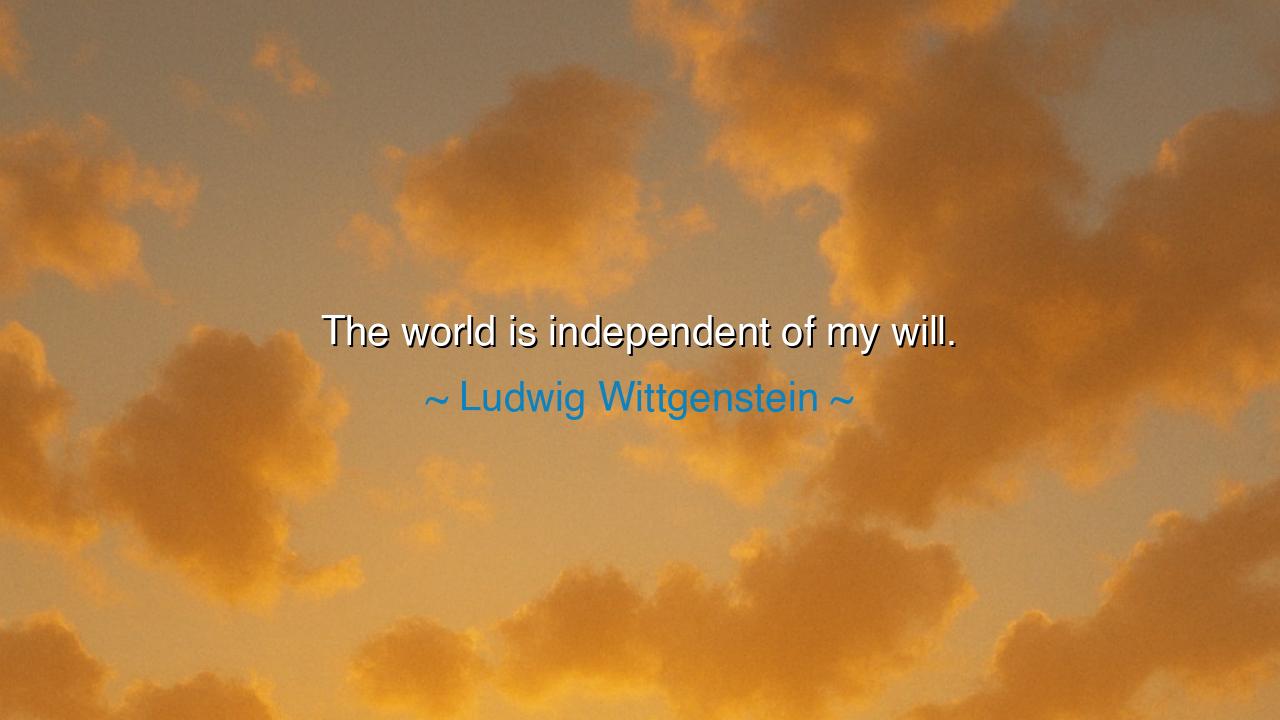
The world is independent of my will.






There are truths so vast that they humble the soul into silence. When Ludwig Wittgenstein declared, “The world is independent of my will,” he was not speaking in despair, but in reverence — for he had glimpsed the limits of human desire and the immensity of existence itself. His words are not a surrender, but a revelation: that reality does not bend to our longing, that truth exists beyond the reach of our commands, and that wisdom begins when the ego ceases to rule. To understand this is to awaken — to see that peace does not come from controlling the world, but from learning to live rightly within it.
The origin of this profound insight lies in Wittgenstein’s Tractatus Logico-Philosophicus, a work written amid the fires of the First World War. He had seen men die by the thousands, nations crumble, and ideals turn to ash. In that chaos, he sought clarity — to understand what could be known, and what must be accepted. When he wrote that “the world is independent of my will,” he was drawing a boundary around the arrogance of man’s mind. For too long, humanity had imagined itself the master of all things — kings commanding empires, scientists conquering nature, thinkers shaping truth. But Wittgenstein saw what the ancients had long known: that reality exists outside the dominion of desire, and that the task of the soul is not to command, but to comprehend.
The world, as Wittgenstein meant it, is the totality of facts — the great web of existence that stretches beyond our control. We may act within it, but we do not govern it. The rising of the sun, the decay of the stars, the birth and death of living things — all unfold indifferent to our wishes. This realization is both humbling and liberating. It humbles us because it reminds us of our smallness; it liberates us because it frees us from the illusion that we must control everything to be at peace. The will is a noble fire, but it burns only within the lamp of human action — it cannot illuminate the whole of the universe.
This truth is echoed in the ancient philosophies that came before. Stoics such as Marcus Aurelius and Epictetus taught the same law of the soul: that there are things within our control and things beyond it, and that wisdom lies in knowing the difference. When the Roman Emperor Aurelius ruled amidst war and plague, he found solace not in command, but in acceptance — in the quiet understanding that though he could not rule fate, he could rule himself. “The universe,” he wrote, “is change; our life is what our thoughts make it.” So too did Wittgenstein see that while man’s will cannot alter the world’s order, it can alter the heart’s response to it.
Consider also the story of Helen Keller, born blind and deaf, who could have easily despaired in the darkness of a world that seemed forever beyond her control. Yet she chose not rebellion, but understanding. Through patience and courage, she learned language, discovered wisdom, and became a beacon of human strength. She could not change the facts of her existence — the world was indeed independent of her will — but she transformed her inner life, and by doing so, she touched countless others. In her example shines Wittgenstein’s lesson: that while the world does not yield to our desires, our spirit can rise above the limits of circumstance.
Wittgenstein’s statement is not an invitation to fatalism, but to clarity. To accept that the world is independent of our will is not to abandon effort, but to purify it — to act without arrogance, to strive without illusion. It means to live truthfully, to see things as they are, and to labor within the realm of what can be changed. The farmer cannot command the rain, but he can till the soil; the sailor cannot quiet the sea, but he can set his sails wisely. So it is with life: we cannot govern the world, but we can govern ourselves.
So, my child, take this wisdom into your heart: do not waste your strength trying to command what cannot be commanded. The world moves by laws greater than any single will, yet within that vast design, you have the freedom to choose your conduct, your attitude, your virtue. Accept the independence of the world, and you will find the independence of the soul. Work earnestly, love deeply, act justly — but do not demand that reality bow to your desires. For peace is not the conquest of the world, but the harmony between your will and the truth of things. In that harmony lies serenity, and in serenity, the highest wisdom of all.






AAdministratorAdministrator
Welcome, honored guests. Please leave a comment, we will respond soon